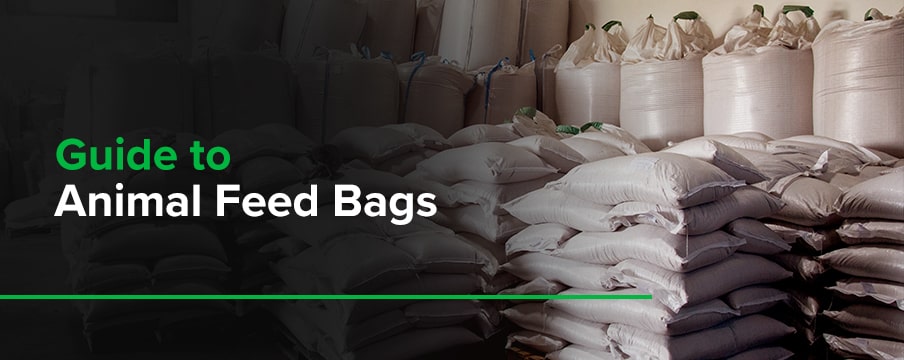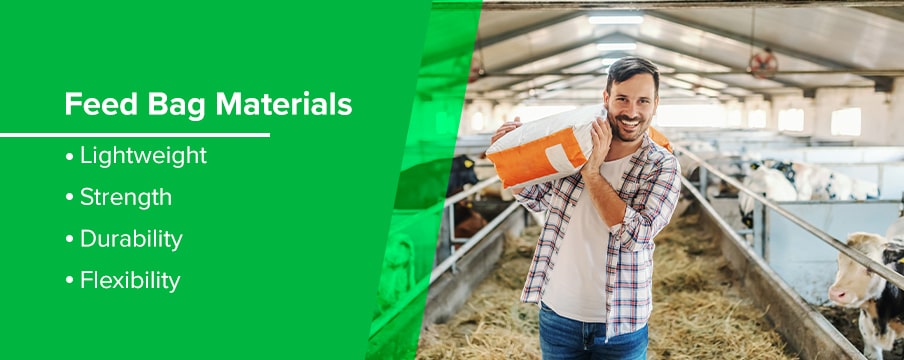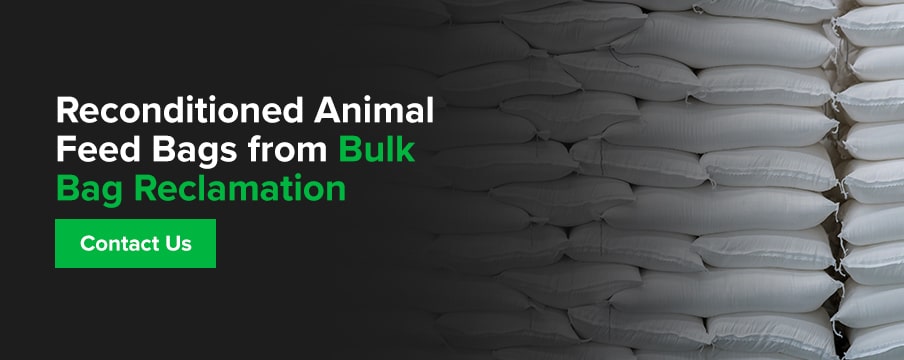Animal feed is commonly stored and transported in bulk bags. Also known as flexible intermediate bulk containers (FIBCs), bulk bags have many uses across various industries, including agriculture. Bulk bags for animal feed help keep the animal feed fresh during storage and transportation. Whether you’re a farmer looking for ways to store bulk amounts of animal feed or a feed supplier looking for new ways to safely package and transport feed, bulk bags are an effective option.
Learn everything you need to know about bulk bags and packaging to determine how they could be your animal food storage solution.
Feed Bag Options
Bulk feed bags come in various constructions and types, each offering different benefits and uses in different applications. Bulk bags are typically constructed in one of three styles — 4-panel, U-panel or circular/tubular. A 4-panel animal feed bag has a separate panel for each side of the bag and the bag’s bottom. A U-panel bag features three panels — two side panels and a U-shaped panel that makes up two sides and the bottom. A circular bulk bag has one tubular panel connected to the bottom.
In addition to different bulk bag designs, there are a few different types of feed bags, which offer different ways to open and close the bags and other structural additions. Here are four common types of bulk bags:
- Open top: Open top bulk bags lack a top panel, making them ideal for applications where bags are filled manually.
- Spout top: Rather than having an open top, spout top bulk bags feature a spout that allows for quick and efficient filling and pouring with minimal spills.
- Duffle top: Duffle top bulk bags have an extra panel at the top that can be closed to completely protect the bag’s contents. These bags are ideal for transporting and storing materials.
- Baffled: Baffled bulk bags feature an additional interior lining that provides more support and creates a fixed cubic shape. Baffled bags help prevent sagging or bulging, which makes packing and stacking bulk bags easier.
Spout top and duffle top animal feed bulk bags are common in agricultural applications for their convenience and extra protection.
Feed Bag Materials
Animal feed bulk bags are made from woven plastic fibers. Polypropylene is the most common plastic used when manufacturing bulk bags, though PVC may also be used for extra durability. Plastic is used for bulk bags because it offers numerous benefits, including:
- Lightweight: Woven polypropylene is extremely lightweight. Bulk bags made of woven plastic typically only weigh between 5 and 7 pounds. Lightweight bags are crucial when storing and transporting materials where loads may have a weight limit. With lightweight bags, the bag will minimally contribute to the overall load weight.
- Strength: Interwoven plastic is extremely strong and can hold up to a few thousand pounds. The woven plastic creates layers that can support industrial loads.
- Durability: Plastic bulk bags are resistant to chemicals, heat, humidity, shrinkage and stretching. They’re also typically watertight, letting them maintain their strength and protect their contents in various environments.
- Flexibility: While woven plastic is extremely strong and durable, it’s also very flexible. It’s pliable and soft, so you can fold and move the bags when you’re not using them.
Keeping Feed Fresh
Like many other consumable products, animal feed is semi-perishable, meaning it will go bad after some time. While animal feed bulk bags and packaging do an effective job of keeping feed fresh, the bags and their contents need to be properly stored to help prevent feed spoilage. Animal feed bulk bags should be stored in a dry, cool and well-ventilated space. When putting new loads in storage, pull old feed bags to the front to ensure they are used before they go bad.
Keep bulk bags stacked on pallets or shelves rather than the floor to prevent contact with damp floors or other chances of moisture. When stacking bulk bags, be sure to leave room for airflow to prevent condensation from building up around the bags. If your load of feed bags comes wrapped in plastic, remove the wrap to prevent mold while the bags are in storage.
Another important aspect of keeping feed fresh, especially during storage, is rodent and insect control. Rodent and insect infestations can significantly damage and spoil your feed. Keep the interior and exterior of your storage area clean, and keep doors closed when not in use. Clean spills promptly and utilize traps, bait boxes, insecticides and other deterrents to catch and prevent any unwanted visitors.
Multi-Purpose Bags
While an animal feed bag’s primary purpose is to protect the feed during transportation and storage, bulk bags serve multiple purposes. Animal feed bags need to display proper labeling to comply with FDA and USDA standards. For example, the USDA requires the bag manufacturer’s name and information to be printed on the bag. Other important information typically labeled on the bag includes the product name, intended purpose, ingredients, feeding instructions, storage instructions, net weight and more. This type of information is crucial so end users know what materials they have and how to use them.
Since manufacturers are required to have their information displayed on the bulk bags, the bags serve as a brand messenger. Some animal feed bulk bag suppliers may include their logos and colors, helping increase brand awareness.
FIBC Feed Bag Sustainability
One of the biggest advantages of using plastic animal feed bags is that they’re recyclable. Rather than dispose of bulk bags and have them end up in a landfill, the plastic can be cut up and reused to make new bulk bags or other plastic products. Used bags can also be refurbished for official reuse, or other uses can be found for old bags. Used bulk feed bags are a great way to increase business sustainability, as you’d be helping keep old bags out of landfills and putting recycled bags to good use.
Reconditioned Animal Feed Bags from Bulk Bag Reclamation
If you’re looking for animal feed bulk bags for sale, consider buying refurbished bags from Bulk Bag Reclamation. Our refurbished bulk bags are held to the same standards as new bags and are high-quality options for transporting, storing and shipping animal feed and other goods. Reconditioned feed bags are a cost-effective option that also increases your sustainability. When you partner with Bulk Bag Reclamation for your animal feed bulk bags, we’ll help you find the best FIBC solutions for your operations. With various capacities, shapes and sizes, we’re sure to have the bags for you.
Contact us for more information or request a quote to get started today.



